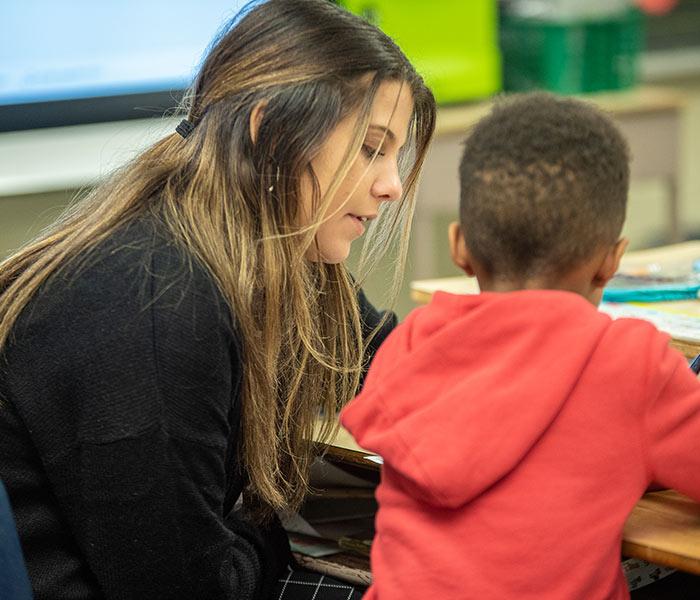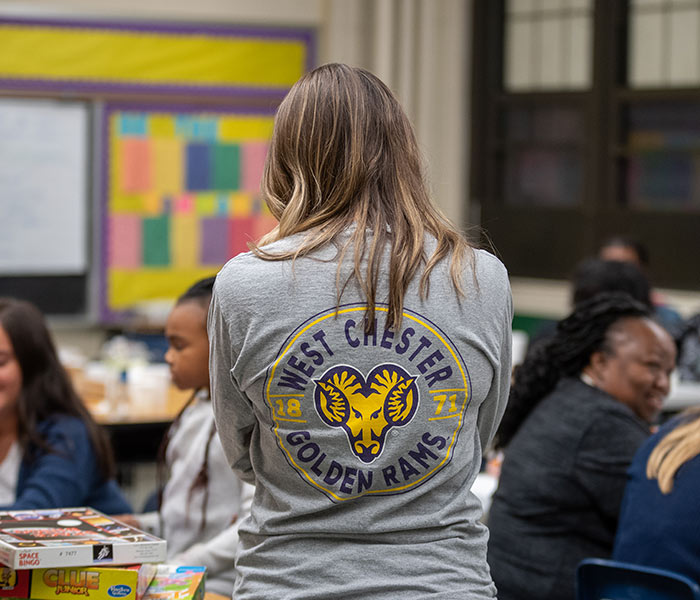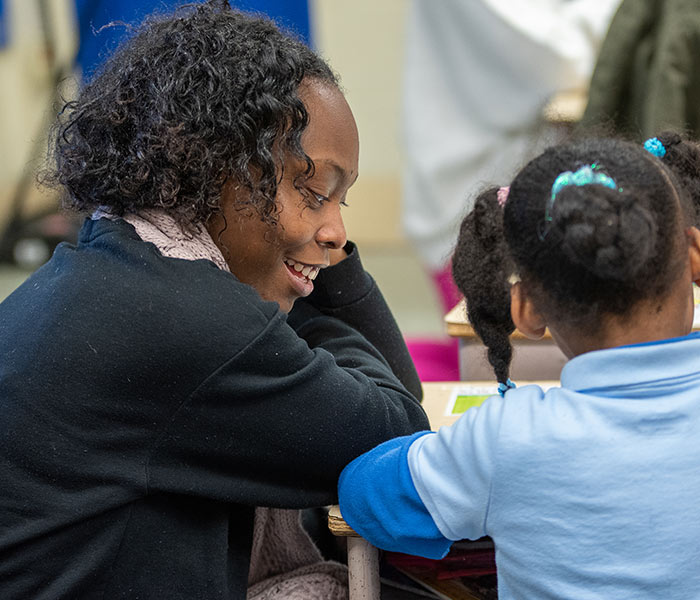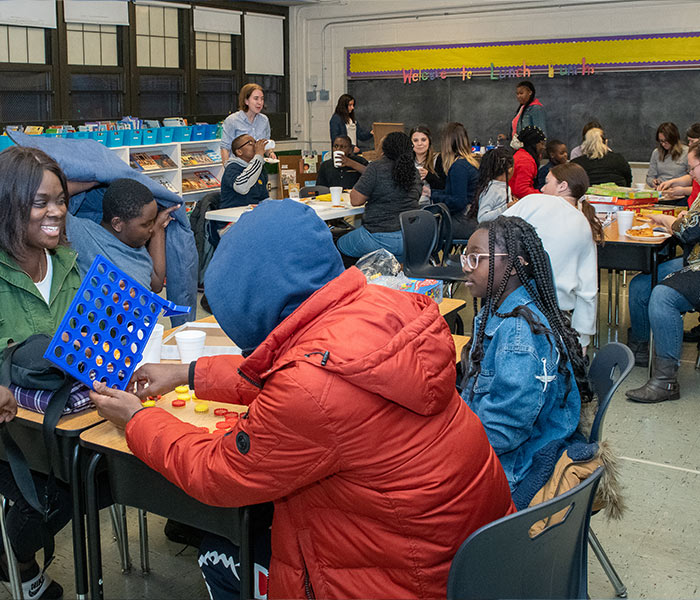COMMUNITY IMMERSIVE SEMESTER
FOR EDUCATORS
What is the Community Immersive Semester for Educators (or, CISE)?
CISE is an undergraduate educator preparation experience in the WCU College of Education and Social Work that focuses specifically on learning how to be a community teacher (Murrell, 2001) with an abolitionist teaching framework (Love, 2019) in historically under-resourced and marginalized communities. We offer Early Grades Preparation students the opportunity to take a full semester of required coursework in an integrated and immersive manner, in partnership with our friends at Add B. Anderson School and the Cobbs Creek neighborhood in West Philadelphia.
What are the goals of CISE?
The goals of CISE are to:
- Prepare teachers who are committed to understanding the context in which they teach and look to the wisdom, history, and cultural resources of the community to support their teaching;
- Challenge deficit perspectives that are commonly held about students, families, and neighborhoods in Philadelphia;
- Develop highly skilled and reflective educators who are committed to teaching in the School District of Philadelphia and other districts that are under-resourced and/or serve students who have been historically marginalized by race, socioeconomic status, or language;
- Develop students’ identities as equity-focused community teachers who are committed to an ongoing process of understanding how structural oppression, power, and privilege impact education.
What is Community-Engaged Teacher Preparation?
Community-engaged teacher preparation is a paradigm that reflects the belief that prospective teachers should learn their craft in the spaces where children live, learn, grow, and play. More specifically, the goal of community-engaged teacher preparation is to develop highly skilled, equity-focused educators with commitments to social justice, culturally sustaining pedagogies, and anti-oppressive education through engagement with historically under-resourced and marginalized communities. Community-engaged teacher preparation upholds collaborative relationships, shared vision, community cultural wealth, community mentoring, and love and joy as core precepts and values for our work.
What are the requirements for participating in CISE?
You must be an Early Grades Preparation major who is willing to be available for full days (8:00 AM-5:00 PM) on Mondays, Wednesdays, and Fridays (some evening and weekend times also required).
What is community mentoring?
We see teaching as relational work, and we emphasize and highlight the value of relationships throughout CISE. One important way in which we do this is through community mentoring experiences. We have an enthusiastic, committed, and loving group of community mentors connected to Add B. Anderson School and Cobbs Creek (caregivers, parents, community elders, climate staff members, etc.) with whom we spend time during the program. Our community mentors serve as ambassadors to the school and neighborhood, teaching us about the strengths, wisdom, and joy of their community while also helping us to understand the barriers and challenges that families face. We work together to identify community needs, understand their underlying causes, and conduct service to work towards solutions.
What about transportation?
Students are responsible for making arrangements for transportation from their campus or home location to Add B. Anderson School and the Cobbs Creek community in Philadelphia. The CISE faculty team is committed to ensuring that transportation barriers do not limit students’ ability to participate in the program. Dr. Solic will work with individual students to develop a transportation plan that meets their needs. In the past, students have formed carpools with one another and utilized public transportation options. Through the generous support of the CESW Dean’s Office and the Literacy Department, CISE participants have been provided travel stipends in the past to assist with the cost of transportation.
What do you mean by an integrated curriculum?
The faculty of the CISE courses engage in collaborative planning ahead of the semester and meet during the semester to ensure that our courses are meeting their Student Learning Outcomes (SLOs) in an integrated manner. All of our courses are taught in such a manner as to share a focus on the concept of a community teacher and an abolitionist teaching framework. Additionally, we share a focus on the following core themes:
- Community teachers learn from a wide range of knowledge sources, including the community and the young people within it.
- Community teachers advocate for their students by working within, around, and against the system. Their advocacy includes, but is not limited to, advocating for appropriate resources and curriculum.
- Community teachers use knowledge of the big picture (the macro) and classroom practice (the micro). Paulo Freire called the ongoing relationship between these two “praxis”.
- Community teachers build bridges with families and value families’ linguistic, cultural, and experiential resources.
The CISE faculty team seeks opportunities to foster and expand connections across our course content, assignments, and immersive experiences.
What if I have already taken one of the courses being offered in CISE?
It is most optimal if students are able to take all of the courses being offered during their semester in CISE. That said, the CISE team is committed to making this experience available to as many students as possible who want to participate in it. If you have already taken one of the courses being offered, we can accommodate you. If you have already taken two or more of the courses being offered, Dr. Solic will work with you to determine whether the program is still a viable option for your personal circumstances and program trajectory.
I’m interested! What should I do next?
Wonderful news! You should contact the CISE Director, Dr. Katie Solic, to set up a program advising appointment. Dr. Solic can be reached via email at ksolic@wcupa.edu.
I loved my experience in CISE and I want to learn more. Are there other opportunities for me at WCU?
Yes! We strongly recommend you consider the Youth Empowerment and Urban Studies (YES) program. Even if you end up being unable to fit in the entire program, the introductory YES 250 course is a powerful experience in and of itself. Additionally, there are opportunities to complete your EDR 317 field experience course and your student teaching semester in placements in Philadelphia (as well as complete both EDR 317 and student teaching as a unified year-long placement in Philadelphia).
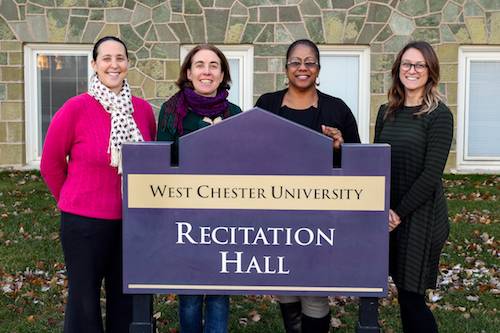
SPOTLIGHT ON INNOVATIVE PROGRAM DEVELOPMENT BY FACULTY
The Community Immersive Semester for Educators
Drs. Katie Solic (Associate Professor, Literacy), Kathleen Riley (Associate Professor, Literacy), Katherine Norris (Professor, Early and Middle Grades Education), and Dana Morrison (Assistant Professor, Educational Foundations and Policy Study) are being recognized for their efforts to envision and develop the Community Immersive Semester for Educators (CISE). Grounded in the precepts of the community-engaged teacher preparation paradigm, and informed by collaboration with teacher-educator colleagues from Ball State University, CISE offers WCU students in the Early Grades Preparation program access to a nationally recognized, evidence-based model for developing the knowledge, disposition, and skills for working with racially and socioeconomically diverse children and families in historically marginalized communities.
The CISE experience allows sophomore and junior students to participate in a full semester of required coursework offered in a fully immersive, integrated manner in partnership with Add B. Anderson School, a neighborhood public school of the School District of Philadelphia located in the Cobbs Creek community in West Philadelphia. WCU students spend three full days a week on-site, working alongside Anderson faculty, staff, and administrators, as well as WCU faculty members. Additionally, all CISE students participate in a community mentoring component of the model, in which they spend time with Cobbs Creek and Anderson School families and community elders, learning from their mentors about the wisdom, values, and strengths of their community.
If you are an EGP student interested in learning more about or applying for the next Fall semester cohort, please contact
Dr. Katie Solic
